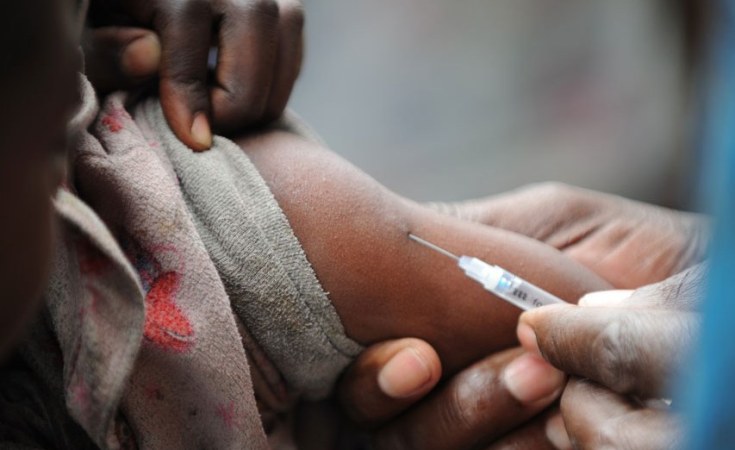A measles crisis is mounting in South Sudan's Western Equatoria state, just as health authorities struggle to overcome a yellow fever outbreak. Since February, seven deaths among children under five and 460 cases have been recorded as of 24 March in three health facilities in Yambio and Nzara counties; 90 per cent of these children had never been vaccinated against the disease.
With measles cases on the rise and vaccination coverage alarmingly low, Médecins Sans Frontières (MSF) urges health authorities and the World Health Organization (WHO) to launch an immediate vaccination campaign to prevent the disease from spreading further.
"When my child fell sick, he was having high fever, diarrhoea and cough. While at home, I gave him paracetamol but there was no improvement," says Victoria John, mother of one-and-half-year-old Mark Emmanuel, who has measles. "We then brought him to the MSF facility where he received treatment for three days. If I didn't come to the facility, I know my child was going to die."
Measles has become a persistent emergency in South Sudan, with recurring outbreaks challenging healthcare systems and endangering communities. More than 12,000 cases have been recorded this year; more than 400 cases were recorded last week alone.
To respond to this emergency, MSF teams are treating measles in Gangura and Sakure health centres, as well as at Yambio State hospital, all located in Nzara and Yambio counties. We will increase the number of beds for measles patients from 32 to 40 due to the rapidly increasing number of cases. MSF teams are also screening children within the communities for potential measles symptoms and to refer them to health facilities if needed.
It is imperative that the Ministry of Health and other health organisations, including WHO, intensify their efforts to expand vaccination coverage across the country and especially those areas most prone to disease outbreaks. Zakaria Mwatia, MSF head of mission
Twenty per cent of children treated for measles at MSF-supported facilities are over the age of five. This highlights the need for a reactive vaccination campaign to reach this group of older children who did not receive measles vaccinations as part of the existing expanded immunisation programme.
The measles outbreak is a double blow for a region still struggling to deal with yellow fever after the most recent outbreak - the fourth in just six years - was declared by health authorities in December 2023. As of mid-March, 81 cases of yellow fever and six deaths have been recorded.
The Ministry of Health, in collaboration with WHO, launched a yellow fever vaccination campaign, immunising around 357,000 people across three counties of Western Equatoria state. The campaign resulted in a reduction in the numbers of suspected and confirmed cases - a testament to the efficacy of mass vaccination campaigns.
"Large-scale vaccination campaigns are vital, both in Western Equatoria state and Northern Bahr el Ghazal state where the current measles outbreaks are ongoing, to halt further spread of the disease and prevent any more outbreaks," says Zakaria Mwatia, MSF head of mission. "South Sudan's fragile health system cannot bear the burden of recurrent outbreaks."
Low vaccination coverage in South Sudan has a significant impact on communities, particularly children, who are highly vulnerable to diseases such as measles, which can lead to serious health complications and deaths.
Given the gravity of the health threats posed by both measles and yellow fever, MSF calls for increased efforts to raise community awareness about the diseases and to adopt best practices to stop them from spreading.
"It is imperative that the Ministry of Health and other health organisations, including WHO, intensify their efforts to expand vaccination coverage across the country and especially those areas most prone to disease outbreaks," says Mwatia.


